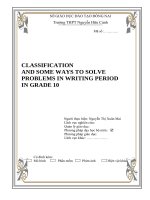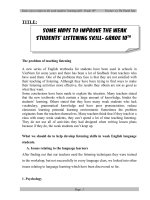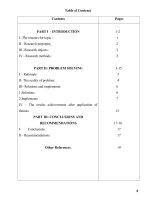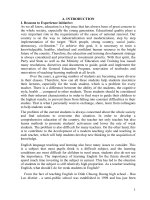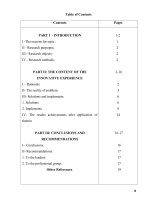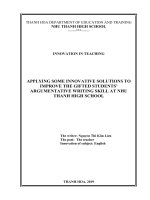skkn SOME WAYS TO IMPROVE THE WEAK STUDENTS’ LISTENING SKILL GRADE 11TH
Bạn đang xem bản rút gọn của tài liệu. Xem và tải ngay bản đầy đủ của tài liệu tại đây (264.16 KB, 20 trang )
Some ways to improve the weak students’ listening skill - Grade 11 h
Teacher :Ly Thi Thanh Tam
TITLE:
SOME
SOMEWAYS
WAYSTO
TOIMPROVE
IMPROVETHE
THEWEAK
WEAK
TH
STUDENTS’
STUDENTS’LISTENING
LISTENINGSKILLSKILL-GRADE
GRADE1111TH
The problem of teaching listening
A new series of English textbooks for students have been used in schools in
VietNam for some years and there has been a lot of feedback from teachers who
have used them. One of the problems they face is that they are not satisfied with
their teaching of listening. Although they have been trying to find ways to make
their listening activities more effective, the results they obtain are not as good as
what they want.
Some conclusions have been made to explain the situation. Many teachers stated
that the new textbooks which contain a large amount of knowledge, hinder the
students’ learning. Others stated that they have many weak students who lack
vocabulary, grammatical knowledge and have poor pronunciation, reduce
classroom learning potential learning environment. Sometimes the problem
originates from the teachers themselves. Many teachers think that if they teach in a
class with many weak students, they can’t spend a lot of time teaching listening.
They do not use all of activities they had designed when writing lesson plans
because if they do, the weak students can’t keep up.
What we should do to help develop listening skills in weak English language
students.
A. Issues relating to the language learners
After finding out that our teachers used the listening techniques they were trained
in the workshop, but not successfully in every language class, we looked into other
issues relating to language learning which have been discovered so far.
Page 1
Some ways to improve the weak students’ listening skill - Grade 11 h
Teacher :Ly Thi Thanh Tam
1. Psychology
We should take into account the psychology of learning habits and skills. Certain
psychological factors should be considered such as memory. We should consider
their mental condition, their ability.
2. Motivation and learning
- Students learn well if they are well-motivated. We can motivate even
unmotivated students.
3. Learning styles
- Visual learners learn through seeing.
- Auditory learners learn through listening.
- Tactile/Kinaesthetic learners learn through moving, doing and touching.
4. Types of Multiple Intelligence
- Visual/Spatial Intelligence: ability to perceive the visual.
- Verbal/Linguistic Intelligence: ability to use words and language.
- Logical/Mathematical Intelligence: ability to use reason, logic and numbers.
- Bodily/Kinaesthetic Intelligence: ability to control body movements and handle
objects skilfully.
- Musical/Rhythmic Intelligence: ability to produce and appreciate music.
- Interpersonal Intelligence: ability to relate and understand others.
- Intrapersonal Intelligence: ability to self-reflect and be aware of one’s inner state
of being.
It is believed that each person has at least 3 or 4 types of intelligence. So we
cannot think that weak learners are unintelligent people.
5. Weak students
Weak students are the students who usually lack basic knowledge or skills, have
difficulty in comprehension. Some teachers say that in the classroom the weak
students often lack concentration. They are easily confused so in the classroom the
Page 2
Some ways to improve the weak students’ listening skill - Grade 11 h
Teacher :Ly Thi Thanh Tam
teacher should give clear, step by step, instructions. The teacher should anticipate
that weak students may need extra help, extra explanations.
B. What we do to help weak students in Listening.
1. At the pre-listening stage: have more time at the pre-listening stage by
shortening the post-listening stage.
At this stage, we carefully prepare the lesson reading the tapescripts and using The
Teaching Listening Checklist. The following activities can be used based on the
content of each lesson:
- Revise and teach vocabulary.
- Revise and teach grammatical structure.
- Create a gap-filling task or other tasks based on the tapescript.
- Train listening skills.
- Train microskills for listening.
- Give some listening tips.
2. At the while-listening stage:
- Remember to tell the aim of listening before you let the students listen to the tape.
- Write a very easy question so that the students can answer after the first listening.
(to encourage them to listen, to make them have a feeling of success).
- Write more additional questions to the listening tasks to make them easy for the
students.
- Ask the students to guess before they listen to the tape. (Do not say what they
guess is wrong or right, ask why they guess so if necessary).
- Be flexible when getting the students to listen to the tape. Read the listening text
if you find it helpful to your students.
- Instruct students how to make the answers while listening ( short answers or main
ideas)
SOLVE THE PROBLEM
Page 3
Some ways to improve the weak students’ listening skill - Grade 11 h
Teacher :Ly Thi Thanh Tam
- In the Tieng Anh 11 textbook in VietNam, activities in the three stages are ready
for the teachers to use. The problem is that many students are still weak at learning
English, particularly, listening. Sometimes they are fed up with listening activities
because they are forced to listen to stories or conversations from the cassette
players, and grasp nothing. Sometimes they feel happy in listening activities,
because they just pretend to do some activities the teacher asks them to do, pretend
to listen to the tape carefully, finish one or two tasks in the textbook and wait for
the answers to the tasks the teacher tell them or someone of their classmates who is
lucky to get the teacher’s book.
- So as to teach weak students effectively, I have designed some units of the 11 th
from textbook such as : Unit 1, unit 2, unit 6, unit 9 and unit 10
A. Unit 1: FRIENDSHIP
I. Warm-up
Alternative: Bingo (for class of lower level)
- Ask Ss to list the characteristics that they expect in their best friends.
- Let Ss down all their vocabulary on the board.
- Let Ss take out a piece of paper and copy down 5 characteristics that they
like best.
- Read out 5 characteristics that T like best.
- Any Ss who have 3 or more choices the same as the T will shout “Bingo”
and they are the winners.
- Expected answers: caring, supportive, helpful, honest, good-nature, quickwitted, humourous, friendly.
II. Pre- listening
Pre-teaching vocabulary:
Help the students to find out the Vietnamese equivalence of other English words
given in the task:
1. apartment building (n) (picture): chung cư
2. guitarist (n) (picture): người chơi đàn ghi ta
3. sense of humor (n, phr) (explaination): tính/óc hài hước
Explaination: A person who can make you laugh easily is a person who has
…..
Page 4
Some ways to improve the weak students’ listening skill - Grade 11 h
Teacher :Ly Thi Thanh Tam
Rough time (n) (synoym) = difficult time: lúc gian khó
- give S.O. a ring = call S.O.
- Checking R.O.R: - happen to know
be through good tires and bad tires
- help S.O. through = help S.O. out of difficulties
Prediction activity:
- Have Ss read and do Task 1 before listening.
- T instructs Ss to pay attention to the linking sounds “ went on” and weak
worm “ came to”
III. While listening
- The task is designed for weak students
- Ask the students to listen to the tape for the first time and answer the following
questions:
Task 1: Multiple choice (worksheet)
- Let Ss listen again and circle the correct answer.
Worksheet:
Listen and circle the correct answer:
1. Ha’s family moved to Hai Phong in
a. 1983
b. 1995
c. 1985
2. People think that Hai Phong are:
a. cordial
b. friendly
c. good
3. Where Lan first went on a trip to Do Son,
a. she rode to Ha’s house to meet her
b. she and her family came to Ha’s house first
c. Ha rode to Do Son right after Lan gave her a ring
4. Long is good at:
a. painting
b. singing
c. playing guitar
5. a. Minh is not only a good listener but also a helpful frienf
b. Minh doesn’t really like to listen to Long’s problem but he always helps
Long
c. Ming is a good listener, but he doesn’t always help Long
- Go over the answer with the class
- Keys: 1. c
2. b
3. c
4. b
5. a
Page 5
Some ways to improve the weak students’ listening skill - Grade 11 h
Teacher :Ly Thi Thanh Tam
Task 2: Taking notes
- Ask Ss to listen again and note the ideas in the table in task 2 p. 18.
- Call on Ss to read their notes and check with the class.
- Expected answer:
How and where did
they meet ?
Lan
- They used to live in
the same apartment
building in Ha Noi
- Lan went on a
holiday to Do Son and
Ha went there to help
her
Long
- They met in college.
- Ming played the
guitar. Long was a
singer.
- They worked
together
What do they like
about their friends ?
-Ha’s very friendly
and helpful.
-Ha’s sociable.
She’s got many
friends in Do Son
and she introduced
Lan around.
-Minh has a sense of
humour.
-Minh likes to go to
plays and movies.
-Ming is a good
listener.
-Minh is friendly
and helpful.
- For the second or third, or fourth listening the teacher should help the students to
finish the listening task in the textbook.
IV. After listening
Speaking: Interviewing
- Have Ss interview their partners about their best friends.
- Suggested questions:
1. How long have you know your best friends for a good friends ?
2. How did you meet this friend ?
3. What do you remember about the first time you meet ?
- Move around to control and give help if necessary.
- Call some Ss to report what they have known from their parners’ friends.
- Ask for Ss’ comments.
- Give comments on what Ss have reported.
Page 6
Some ways to improve the weak students’ listening skill - Grade 11 h
Teacher :Ly Thi Thanh Tam
Unit 2: PEOPLE’S BACKGROUND
I. Warm - up:
- T asks Ss to present their ideas
1. What does a fire cause ?
destroy buildings, houses, forest
A fire
a lot of smoke
kill people
Lead-in:
- The listening lesson today is about the fire happening to Christina’s family
13 years ago
II. Before listening
Pre-teaching vocabulary:
memorable (n) (synonym)
+ What is the synonym of “unforgettable” ?
scream (v) (action)
+ Do the cation of “scream” and ask Ss “What am I doing ?“
gas stove (n) (picture)
+ Show a picture of gas stove to Ss
appeciate (v) (definition) to recognize the good qualities of SO/Sth: đánh giá
cao
protect (v) (picture + situation)
+ Show a picture of a greenhouse and ask Ss question:
What is this ? What do people use it for ?
+ Ask Ss to fill in the following sentence with a verb:
People grow young plants in the greenhouse to …… them from the weather.
- Before listening and completing the task, Ss should be given more explanation
Be + PP
Passive
Can be + PP
Note: After the above activities, students can obtain more words needed for
listening to do the task.
Page 7
Some ways to improve the weak students’ listening skill - Grade 11 h
Teacher :Ly Thi Thanh Tam
II.
While listening
I have made a little alter to have students prepare the lesson plans carefully
in class, exploit the transcript and develop further their language skills
Task 1: Gap-fill (task 2 p. 28)
- Tell Ss to read through the passage and guess the world in each gap.
- Ask Ss to listen to the resordings and fill in the gaps.
- Go around to control and give help if needed.
- Give feedback.
Expected answer:
1. small
2. everything
3. family
4. replaced
5. took
6. apppreciate
Task 2: Questions and answers
- Ask Ss to work in pairs.
- Tell Ss to listen again and answer the questions.
- Call on Ss to give the answers.
- Check with the class
In this stage, t should give Ss some advice in writing skill (in short
answers)
1. What is Christina’s job ?
2. When did her most unforgettable experience happen ?
3. What was she doing then ?
4. Did the fire take many things from her ?
5. What did she realize after the fire ?
Expected answer:
1. She is a businesswoman.
2. (It happened) 13 years ago.
3. It started in the kitchen.
4. Yes, it did.
5. She realized that family was more important than things.
III. After listening:
Have Ss work in groups of four or five to give their opinioins on the sentence:
“Family is more important than things”
- Ask them to put a red card next to the sentence if they disagree with it and
a green one if they agree, and justify their answers.
- Call some groups in to report their group’s ideas.
Page 8
Some ways to improve the weak students’ listening skill - Grade 11 h
Teacher :Ly Thi Thanh Tam
- Give feedback.
Suggested ideas: (deliver handouts)
Family is more important than things because it can’t be replaced. It gives
you mutual love, support and sincere understsanding. It brings the individual
place and happiness.
Nothing is more precious than the sweet moment when every member of the
family finds themselves among their dear ones, taking a good meal and getting
through a peaceful night.
C. UNIT 6: AN EXCURSION
I. Warm – up:
Game: Picture guessing (pictures of a marathon race)
- Divide the class into 2 groups.
- Let Ss guess the picture sticked on the board by listening to the information
the T says or looking at the pictures the T shows.
In order to guess the picture, Ss have to connect the information they have
received.
- The group that can give the correct answer first will win the game.
- Check Ss understanding of instructions.
- Have Ss start the game
Hints: 1. Show the picture of an Olympic game.
2. Show the picture of Boston
3. Write on the board: 42 km.
4. Say: Do Thi Bong
- Declare the winner.
II. Pre- listening:
- Elecit the meanings from Ss, let Ss listen and repeat the difficult words.
- Notice the stress.
1. race (n) (picture): cuộc đua
(picture-eleciting): nói về vận động viên hoặc điền kinh)
2. athlete (n): vận động viên điền kinh
+ Show the picture of an athlete and ask: Who’s this ?
+ What is the adjective of “athlete” (an athlete) ( athletic)
3. formally (adv): 1 cách trang trọng.
4. clock (v) (eleciting) bấm giờ đạt được (thời gian/khoảng cách /tốc độ
được nói rõ)
+ Ex: He clocked 9.6 seconds in the 100 metres.
+ Eliciting: - What does “clock” mean ?
- What is the verb of “clock” ?
Page 9
Some ways to improve the weak students’ listening skill - Grade 11 h
Teacher :Ly Thi Thanh Tam
- What does it mean ?
5. female (n) (adj) (adj) (symbol): giống cái, đàn bà.
+ Point to each symbol and ask: What does this symbol indicate ?
III. While listening:
I have designed the order of the tasks to suit the weak students
Task 1: Matching (Handouts)
- Let Ss 2 minutes to read the information 1 more time.
- Have Ss listen to the dialogue once and twice and match the numbers with
their meanings.
- Ask Ss to compare their answers with their partners.
Worksheet:
A
B
a. 1987
1. The year when thousands of runners from many different
countries ran in the Boston Marathon.
2. The year when women were accepted to take part in the
Boston races.
3. The year the Boston Marathon began.
4. The year when 8 women started the race and they all
finished.
5. The number of towns that runners have to go through during
the Boston Marathon race.
6. The number of runners who took part in the 1st Boston
Marathon.
7. The length of the Boston race.
8. The number of countries who took part in the Marathon race
in 1984
b. 1961
c. 1975
d. 1984
e. 15
f. 34
g. 42
h. 13
Keys:
a. 3
g. 7
b. 2
h. 5
c. 4
Page 10
d. 1
e. 6
f. 8
Some ways to improve the weak students’ listening skill - Grade 11 h
Teacher :Ly Thi Thanh Tam
IV. After - listening
• Ask students to summarize with the chart.
The Boston Marathon
1987
Women’s race
In the Boston
Thousands of
runners
1967
34 countries
1984
The Boston Race
42 kilomatres
runners
13 towns
end
The centre of Boston
D. UNIT 9: THE POST OFFICE
I. Warm-up
- T has the students guess:
Guessing game: What is it ?
- T gives cues and Ss guess what the thing is by raising Yes/No questions.
Cues:
1. It was invented in the 1870.
2. It was invented by Alexander Graham.
3. It is used to transmit speech in along distance.
Example exxhange:
T: It was invented in the 1870s
Page 11
Some ways to improve the weak students’ listening skill - Grade 11 h
Teacher :Ly Thi Thanh Tam
Ss: Is it the telegraph ?
T: No, it isn’t
Chatting:
1. Is your family on the phone ?
2. What is your phone number ?
3. When did your family have the telephone line installed ?
4. Did many families have it at that time ?
5. How about now ?
6. Does any members of your family have a cell phone ?
II. Pre - listening
- Helps the students to find out the Vietnamese equivalence of other English words
given in the task:
1. commune (n) (explanation): xã, thôn.
Explanation:
country Province Village Ward ?
communal (n): công cộng, chung
2. rural network (n) (explanation + picture): mạng lưới (điện thoại) nông thôn.
Explanation:
- Show a picture of the countryside and asks Ss where it is.
- Ask: The telephone network in the countryside is called …? (rural
network)
3. capacity (n) (translation): công xuất, năng xuất.
4. subscriber (n) (definition): thuê bao
Definition: What do you call a person who pays a fixed sum of money every
month for telephone service ?
Checking: R.O.R:
Prediction: (handouts)
- Ask Ss to read through the statements in the Multiple Choice section and
predict the answers.
- Ask to compare their prediction with their partners.
- Write Ss’ prediction on yhe board:
Page 12
Some ways to improve the weak students’ listening skill - Grade 11 h
Teacher :Ly Thi Thanh Tam
Statements
Predict
Check
1. According to the passage, Vietnam ranks for grown in
telephone numbers.
2. Vietnam is among the countries in the world that have
more than 2 million telephones
3. In 1996, Vietnam began upgrading its … networks
4. According to the interview, at present … % of
communes across Vietnam have telephone services.
5. Which aspect of development in Vietnam
telecommunications is not mentioned in the listening
passage ?
Note: After the above activities, students can obtain more words needed for
listening to do the task.
III. While –listening
- So as to help the weak students to improve their listening skill effectively, I have
desinged the tasks from easy to difficult
Activity 1: Checking prediction
- Ask Ss to listen to the monologue and check their prediction.
- Let Ss listen for three times.
- For the first listening, ask Ss to do nothing but listening.
- For the second and third listening, get Ss to take notes and compare their
answers with their partners.
- Ask Ss to report the results.
- Give feedback.
Activity 2: Comprehensionquestions
- Run through the questions on page 106 to make sure Ss understand all of
them.
- Ask Ss to listen to the tape again (once, twice or three times depending on
their abilities) and find the answers to the questions given.
- Get Ss to compare their answers with their partners.
- Tell Ss to ask and answer these questions in open pairs, then in closed pairs.
- Give feedback where needed.
Page 13
Some ways to improve the weak students’ listening skill - Grade 11 h
Teacher :Ly Thi Thanh Tam
VI. After- listening
Game: Lucky boxes
1
5
2
6
3
4
7
- Prepare 7 small boxes, in which there are small pieces of papers with
questions on them (these questions are about the content if the listeing task
above). Not all boxes have questions. There are some lucky boxes. (Mark
these boxes with red pieces of papers inside)
- Get Ss to play this game in 2 teams.
- Let Ss choose a box.
- Open it and give 5 marks for a correct answer.
If Ss choose a lucky box, they get 10 marks and have the right to choose
another box.
The game goes on until all boxes are opened.
The team with more marks will win the game.
Box 1: Lucky box !
Box 2: How many telephones were there in Vietnam in 1996 ?
Box 3: Which country has the highest growth in telephone numbers ?
Box 4: Lucky box !
Box 5: Lucky box !
Box 6: How many percent of countries in Vietnam have telephone services ?
Box 7: What is the rank of Vietnam for growth in telephone numbers ?
Ask Ss to write the summary of the listening passage using the hints given page
106.
Page 14
Some ways to improve the weak students’ listening skill - Grade 11 h
Teacher :Ly Thi Thanh Tam
E. Unit 10: NATURE IN DANGER
I. Warm-up
T has Ss look at the pictures and name them
Picture 1
Picture 2
Picture 3
Picture 4
Answers:
P1: Nam Cat Tien national park
P2: U minh national park
P3: Cat Ba national park
P4: Bach Ma national park
Lead-in:
-To know what danger these national parks can face with, to day we are listening
to a text about national parks in the United State
II.
Pre - listening
Pre-teaching vocabulary:
1.
scenic feature (n) (translation)
Eliciting question: How do you say đặc trưng về thiên nhiên xinh đẹp in
English ?
2.
devastating (adj): tàn phá (definition)
Eliciting question: An adjective that means causing a lot of damage.
Page 15
Some ways to improve the weak students’ listening skill - Grade 11 h
Teacher :Ly Thi Thanh Tam
3.
approximately (adv): xấp xỉ (synonym)
Eliciting question: another word of nearly or about.
4.
vehicles (n): xe cộ (example)
Eliciting question: something like cars, bicycles, lorries, buses, …
5.
maintenance (n): sự duy trì.
Eliciting question: Find a word that means keeping something in good
condition.
Checking vocabulary: R.O.R
Here are some statements about national parks in the United States. Read and
guess if they are true or false.
- Copy the True – False Statement Predictions (Task 1 page 119) on the board
and draw the table.
- Ask Ss to guess if the sentences are true or false then note down. Ss’
predictions on the table.
1 2 3 4 5
Predict
Correct
Note: After the above activities, students can obtain more words needed for
listening to do the task.
III. While –listening
Task 1: True or False Statements:
- Have Ss listen to the text twice and check their predictions.
- Ask Ss to compare their answer then call them out. If it is false, say why.
Key:
1. National parks protect and preserve the national beauty of the land.
2. They usually contain a variety of scenic features.
3. All national parks, not all being destroyed.
Many national parks, not all national parks.
4. Large areas of national parks can be destroyed by fire.
5. Visitors do not help to preserve and protect national parks.
Page 16
T
T
F
T
T
Some ways to improve the weak students’ listening skill - Grade 11 h
Teacher :Ly Thi Thanh Tam
Task 2: Multiple choice:
- Prepare the multiple choice beforehand for Ss to choose. (see the Appendix)
- Deliver the handouts.
- Ask Ss to read the questions and guess the answers before listening.
- Play the recording. Have Ss listen and choose the correct answers.
- Compare their answer together.
APPENDIX: Unit 10 – Listening – Task 2
1. How many national parks are there in the United States ?
a. 50
b. 52
c. 53
d. 55
2. How many people visit national parks every year ?
a. five thousand
b. three thousand
c. millions of visitors
d. billions of visitors
3. Can you name some of the problems which national parks are currently
facing ?
a. Rare animals are killed or hunted for fur, skin or other parts.
b. Trees are cut down for wood.
c. Devasting fires are caused by careless people.
d. All are correct.
4. What should be done to protect national parks ?
a. Increase the number of visitors to earn more money for the parks.
b. These problems should be solved gradually.
c. Money should be raised for the park’s staff and maintenance of their
resources.
d. If there is not enough money, some national park should be destroyed.
- Check the answer key.
1. b 2. c 3. d 4. c
VI. After- listening
- For weak students, T gives the cues to help students to discuss the ideas
- Ask Ss to work in groups of 5 to discuss these questions. The leader from each
group will note down Ss’ ideas.
- Ask Ss to work in pairs, using the questions in task 2.
Page 17
Some ways to improve the weak students’ listening skill - Grade 11 h
Teacher :Ly Thi Thanh Tam
Discussion:
Have you ever visited a national park in our country ? Or Have you
ever seen a national park in Vietnam on TV ?
What is there in the National Park ?
Does it have the same problems as the other national parks ?
What should we do to protect our national parks and What shouldn’t
we do to destroy them ?
Feedback: One representative of each group comes to the front of the class and
presents their ideas.
- Ask otther Ss to share ideas.
Give comments on each group.
- Based on the information in task 1 and task 2, Ss write a summary of the
test.
After having applied the reseach, I have the students do some 20 minute
tests and I get the specific results
RESEARCH RESULT
Class quantity
THE FIRST TEST
11A10
45
5hs Good students – 11,1 %
25 Average students–55,6%
15 Poor students – 33,3%
10 Good students - 22,2%
11A8
45
30 Average students – 66,7%
5 Poor students – 11,1%
THE THIRD TEST
10 Good students-22,2%
27 Average students-60 %
8 Poor students - 17,8%
15 Good students-33,3%
30 Average students 66,7%
Conclusion
Our way of teaching listening is that we change our attitudes towards the students’
ability in listening, prepare the lesson plans carefully in class, exploit the transcript,
try our best to lead the listening lessons in a flexible way and study other issues in
relation to teaching and learning such as motivation, psychology and learning
styles.
Page 18
Some ways to improve the weak students’ listening skill - Grade 11 h
Teacher :Ly Thi Thanh Tam
You, certainly, have your own difficulties in teaching listening and you have your
own way of teaching listening and helping your students to listen in English. But
one more thing I would like to say is that do not think or say about your difficulties
in teaching listening. When you think you have difficulties, you cannot do
anything because everything will be difficult for you. Identify the difficulties you
have and your students have and find the way to overcome those.
Thank you very much
Bien Hoa city, May 25th, 2013
Teacher
LY THI THANH TAM
Page 19
Some ways to improve the weak students’ listening skill - Grade 11 h
Teacher :Ly Thi Thanh Tam
References
- In – service teacher training materials by MOET of Viet Nam.
- Introduction to TESOL – Teaching Listening.htm.
- A Profile of the Slow Learner – Teacher Education Project (U.S.A).
- English Now – Issue 9, November 2004.
- Listening in Action, Michael Rost, Prentice - Hall, 1991.
- Mac Yin Mee (University of Malaysia) – Teaching Listening: An overview. The
English Teacher. Vol XIX July, 1990.
- Adrian Tennant – Listening matters: Process Listening. OnestopEnglish.
- Miriam Greif - “Weak Learners” in High School – Must they read?
- Designing English Lesson Plan 11 (Tran Thi Ai Thanh, Ho Thi Tan Hoa, Huynh
Thanh, Tran Thi Dieu Hoa)- Hanoi Publisher
Page 20

